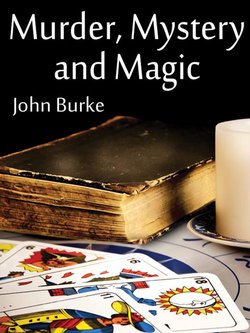Читать книгу Murder, Mystery, and Magic - John Burke - Страница 5
На сайте Литреса книга снята с продажи.
ОглавлениеPLEASE PUT ME IN A BOOK
There used to be a time when no one from London ever thought of coming to live on our coast. Too cold for them. But now they’re all at it—buying up weekend cottages and places to retire to. If you can stick the first six months, you live for ever.
That’s what this Jeremy Craven fellow was told when he moved in. And put it straight away into one of his books. Hardly in the place, and already he was writing clever-clever things about folk who’d lived a lifetime here. And lecturing the Ladies’ Flower Arranging Society and Rotary and the Young Wives and all that lot.
I went up to him after one of those talks. And I told him. “You ought to put me in a book” I told him. “If I had the time, I could write it myself.” And then a couple of women came twittering round him, and he put on the charm and he’d got no time for me.
But I soon saw him again. In one of the local pubs. Got his own tankard by now, and calling the landlord “Eric, old son.”
I asked him if he was interested in murder. He’d heard about the Senwich Common murder, hadn’t he? It had been in all the papers. And of course most people still thought that half-baked young postman did it.
But I knew better.
I could tell him.
Then Eric leans over the bar and ruins it all. “If Fred’s telling you all about the murders he’s committed, don’t you pay him no heed. He’s always having us on.”
So Craven props his elbow on the bar, and there’s Eric grinning and telling him, “Every time there’s a death anywhere in Britain, off goes Fred to the station to confess.”
“Oh,” says Craven. “One of those? Fascinating.”
And you know, he really did look interested now, and I could see he was going to come over and patronise me—like the police do whenever I go and try to help them; or that doctor I was made to go and see. Well, I wasn’t here to be laughed at. I downed my pint and went.
Next thing, he was off for a few months and I didn’t slap eyes on him again till the end of the summer. I was walking past that little group of beach huts we’ve got at the north end, and suddenly he’s standing in the doorway of one of them. Seems the Johnsons, who always go off to the Canaries for the winter, had given him the key.
He called me over, and he’d got a sort of greedy look in his eye; and he started nosing into why I felt this compulsion, as he put it, to go and confess every time there was a murder. He was so patronising, so damn sneering. I took it for as long as I could, trying to hint just that there were things I really could tell him if I wanted to, which I didn’t. Then I found I couldn’t stand the sound of his voice any longer.
There was a folded deckchair propped against one wall of the hut...and when I simply had to put a stop to that voice I did the only thing possible: I picked it up and bashed him over the head and went on bashing until he couldn’t take any more and couldn’t make any more of those silly wailing, grunting sounds.
Then I was very calm. Like some master criminal in a book—a good book, not one of his.
I had a look outside. Nobody about. So I tossed the chair into the sea and watched it being carried away. And I locked the door of the hut behind me and threw the key into the water as well. No one would find him till the Johnsons came back in the spring. No one would ask questions. He was a writer, he was always going off somewhere.
But after a week or so I couldn’t bear the thought of him being in there, and nobody knowing I’d really done it this time.
In the end I had to go to the police station. The moment I walked in, the desk sergeant said: “Here’s Fred. Come to confess to killing Mr. Craven? Who tipped you off?”
I started in to tell him exactly how I’d done it, but he just snickered, that way he always has. And then I heard what the whole town knew by the evening: that Craven had been using the beach hut for...well, meeting a girl. A girl he shouldn’t have gone near, a real bit of trouble. Anyone in the town could have told him that. And yesterday she’d gone down to let herself in, and found him—“That’s her story,” they all said—and someone heard her scream. But she’d done a fair bit of screaming ten days ago, in the pub with him, saying she had a good mind to beat his brains in. And the hut was plastered with her fingerprints. And she said she hadn’t done it, and there were lots of things the police weren’t happy about, but some of Craven’s things were found in her bungalow, and anyway she’s coming up for trial.
And they won’t listen to me.
You know what it’ll be like. Some newspaper’ll pay for her defence, just for the exclusive story, and then someone’ll come along and write a book about her.
It’s not right. What about me?
I’m the one who ought to be in a book.
